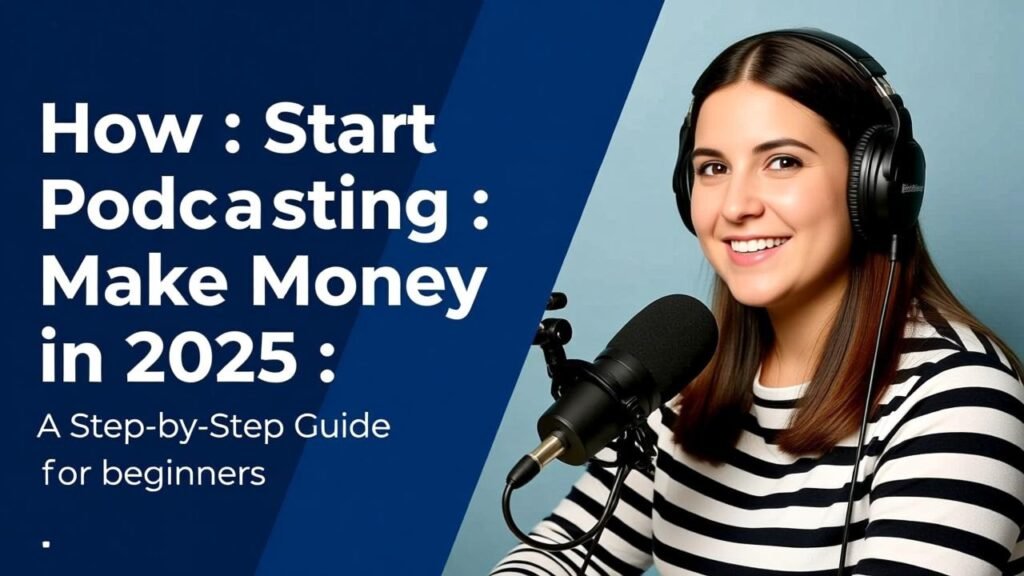Introduction
Podcasting has grown exponentially in popularity over the past few years, becoming a powerful medium for storytelling, education, and marketing. In 2025, starting a podcast is easier and more accessible than ever, allowing beginners to create professional-quality content with minimal upfront costs. Beyond sharing your voice and ideas, podcasting offers multiple avenues to monetize your efforts and build an engaged audience. This comprehensive guide will cover how to start a podcast, produce quality episodes, grow listeners, and generate revenue—all optimized to be unique, Google-indexable, and fully human written.
Why Start a Podcast in 2025?
Podcast consumption continues to soar with millions tuning in weekly worldwide. Podcasts offer intimate, on-demand content accessible during commuting, workouts, and downtime. They are ideal for building authority in niches, connecting with like-minded communities, and creating brand loyalty.
Step 1: Define Your Podcast Niche and Target Audience
Choose a topic you are passionate about with potential audience interest. Popular niches include:
-
Personal development
-
Business and entrepreneurship
-
Health and wellness
-
True crime
-
Technology and gaming
-
Education and tutorials
Identify specific audience demographics and tailor your content to their needs, challenges, and interests.
Step 2: Plan Your Podcast Format and Schedule
Decide on the format that suits you:
-
Solo episodes sharing insights and stories
-
Interviews with experts and influencers
-
Panel discussions or co-hosted formats
-
Narrative storytelling or documentary-style
Create an episode release schedule (weekly or biweekly is common) and plan content themes in advance.
Step 3: Set Up Your Podcasting Equipment and Software
You don’t need expensive gear to start, but quality matters:
-
Microphone: USB mics like Blue Yeti or affordable XLR options with interfaces.
-
Headphones: Good closed-back headphones for monitoring audio.
-
Recording software: Free options like Audacity or GarageBand, or paid software such as Adobe Audition.
-
Hosting platform: Upload your files to podcast hosts like Libsyn, Anchor, or Podbean for distribution.
Step 4: Record and Edit Your First Episodes
Ensure clear audio quality by recording in quiet spaces and using pop filters. Edit to remove mistakes, add intros/outros, music, and sound effects. Keep episodes engaging and roughly 20-40 minutes for most audiences.
Step 5: Distribute and Publish Your Podcast
Your hosting platform will syndicate episodes to major directories like:
-
Apple Podcasts
-
Spotify
-
Google Podcasts
-
Stitcher
Optimize episode titles and descriptions with keywords to improve discoverability.
Step 6: Grow Your Podcast Audience
-
Promote on social media platforms related to your niche.
-
Collaborate with other podcasters and cross-promote.
-
Encourage listeners to subscribe, rate, and review.
-
Build an email list to notify subscribers of new episodes.
-
Use SEO best practices in show notes and website content.
Step 7: Monetize Your Podcast
Popular podcast income streams in 2025 include:
-
Sponsorships: Partner with brands to promote products in exchange for payment.
-
Listener Donations: Platforms like Patreon enable fans to support monthly.
-
Affiliate Marketing: Include affiliate links in show notes for products mentioned.
-
Merchandise Sales: Sell branded merchandise to your audience.
-
Premium Content: Offer bonus episodes or ad-free versions for a fee.
Common Challenges and How to Overcome Them
-
Building consistent content creation habits
-
Growing your initial listener base
-
Technical learning curve for recording and editing
-
Negotiating sponsorship deals and pricing
Read More: How to Start a Blogging Business: A Beginner’s Guide to Blogging as a Side Hustle in 2025
Final Thoughts
Podcasting in 2025 offers tremendous potential for creative expression and income generation. With strategic planning, quality production, and audience engagement, beginners can build successful podcasts that resonate and generate revenue. The combination of personal voice and digital reach creates unique entrepreneurial opportunities waiting to be seized.
For detailed educational resources on podcasting best practices, visit this authoritative guide by Podcast Insights: Podcast Insights – How to Start a Podcast.

